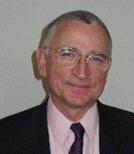Michel Komajda Pierre et Marie Curie大学Pitie Salpetriere医院心脏病学教授,ESC现任副主席、当选主席(下届主席);2001-2002 ESC心力衰竭工作组主席,研究领域:1.扩张性心肌病、肥厚性心肌病的基因研究;2.心力衰竭诊断和治疗
EUROGENE Heart Failure Project首席研究者,本届大会即将公布的SHIFT研究主要研究者
 ●Pierre et Marie Curie大学Pitie Salpetriere医院心脏病学教授
●Pierre et Marie Curie大学Pitie Salpetriere医院心脏病学教授
● ESC现任副主席、当选主席(下届主席);2001-2002 ESC心力衰竭工作组主席
●研究领域:1.扩张性心肌病、肥厚性心肌病的基因研究;2.心力衰竭诊断和治疗
●EUROGENE Heart Failure Project首席研究者,本届大会即将公布的SHIFT研究主要研究者
M Komajda(Michel Komajda) is from the Pitié Salpetrière Hospital in Paris, France, who is currently vice-president of the ESC, President-Elect of ESC and will preside over the society in 2011.
Dr. Komajda is a Professor of Cardiology in the Department of Cardiology at University Pierre et Marie Curie and Pitie Salpetriere Hospital in France. In service of the European Society of Cardiology (ESC), he is the Vice President of Associations, Working Groups, Councils from 2006 to 2008. He is also currently a Team Leader for INSERM Research Unit 621 "Genetique, Physiopathologie et Pharmacologie du Remodelage Cardiovasculaire". He was the Chairman of the ESC’s Heart Failure working group from 2001-2002, and member of the writing committee for the ESC’s "Chronic Heart Failure Guidelines" from 2001 to 2005. He was a Board Member of the French Society of Cardiology from 1991-2006, serving as the President from 2002-2003. He has been on the steering committee for many major cardiovascular trials through out his career; most recently CARMEN, COMET, I-PRESERVE, HEAAL, SHIFT, and RECORD. He has also published numerous articles that have contributed to the advancement of the treatment of heart failure.
Komajda’s research interests have focussed on the genetics of dilated and hypertrophic cardiomyopathy, with a view to offering genetic analysis for families with the condition. The diagnosis and treatment of heart failure has been another prominent theme in his career. As one of the principal investigators on the EUROGENE Heart Failure Project, he has facilitated a European network of nine different centres from seven countries, which have enrolled 3000 patients with a view to identifying the genes involved in heart failure. “Here we hope to identify modifier genes that influence the clinical presentation and prognostic stratification of heart failure,” he explains, adding that the project should eventually allow identification of patients requiring intensive follow-up and care.
 京公网安备 11010502033353号 增值电信业务经营许可证:京ICP证150541号
京公网安备 11010502033353号 增值电信业务经营许可证:京ICP证150541号